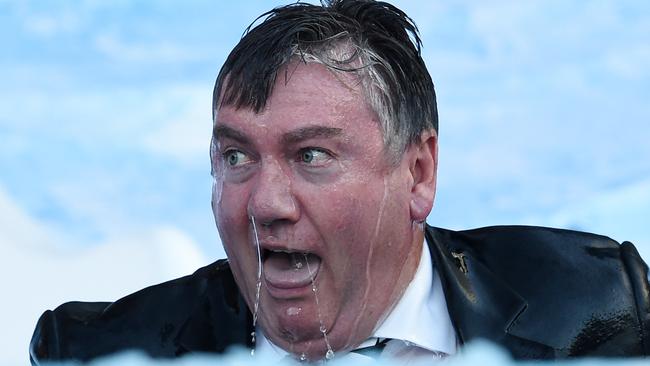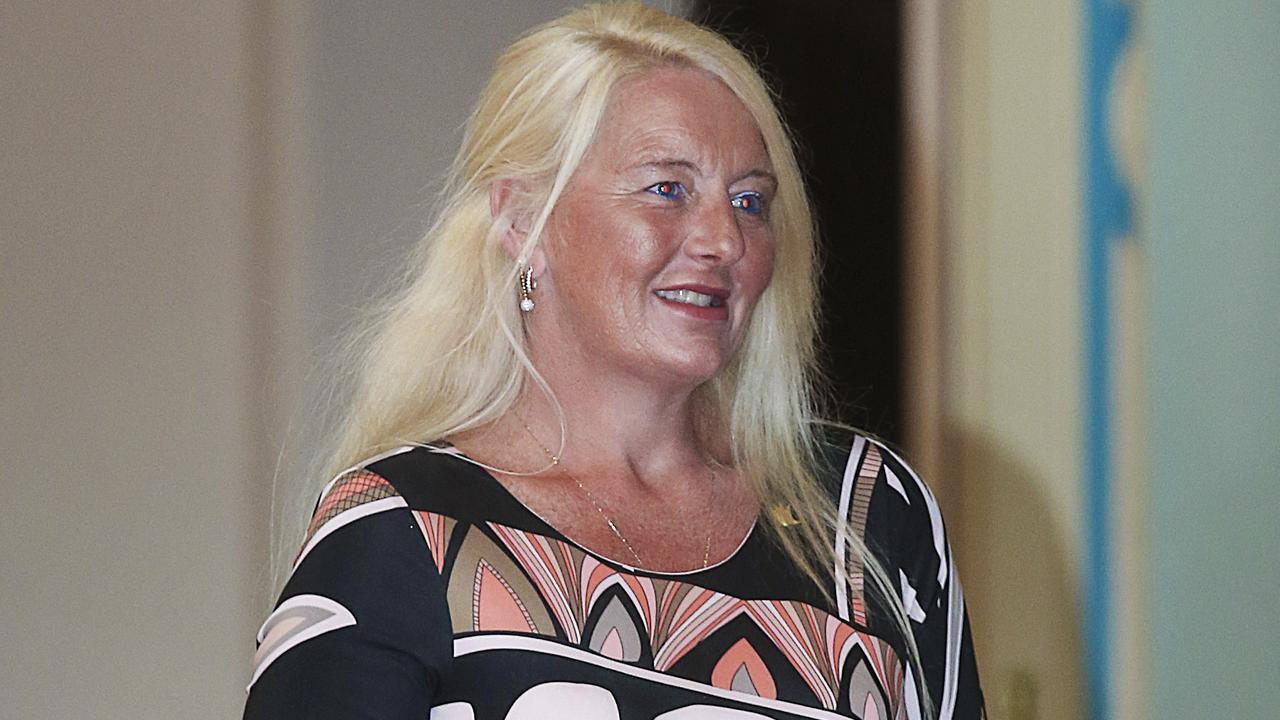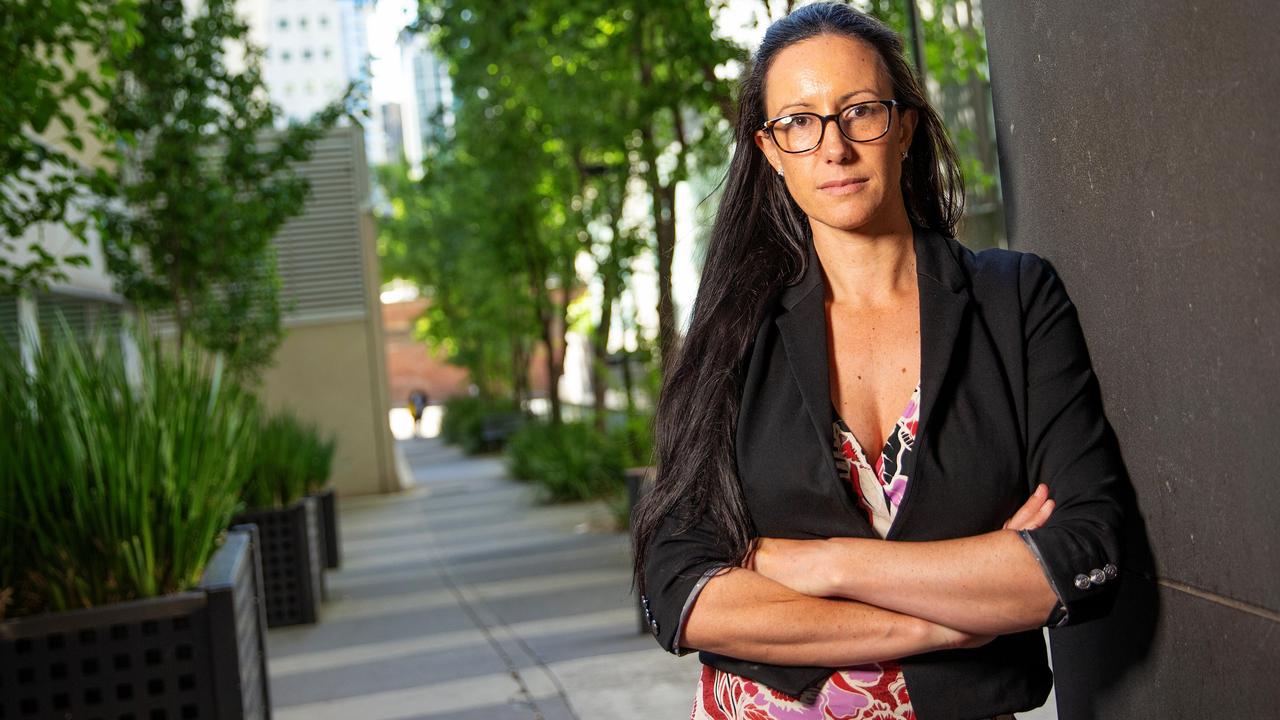Eddie McGuire mea culpa for remark on drowning Caroline Wilson

When Eddie was king, life was simpler for Australian men. To a young, sports-mad journo with his own TV show, a jacket pocket stuffed full of nightclub drink cards and a contact book bristling with the names of football stars and media powerbrokers, the rules of the game were simple: in this bloke’s world, keen talent, hard work and the right mates would take you a long, long way.
Eddie is still a king of sorts, but the past few days demonstrate how the world around him has shifted beneath his feet, leaving the Collingwood president and some of his mates bewildered about their altered surroundings.
At the end of Melbourne’s FM radio dial, Triple M hosts Eddie’s natural audience: blokes driving their utes to Bunnings nursing bourbon hangovers and broken footy dreams. On Thursday nights, The Footy Show kicks into overdrive this caricature of masculinity, with James Brayshaw and Sam and Billy and the gang. But the mainstream male of Eddie’s era is now merely a subculture, a shrinking reminder of how things mostly were.
For the best part of two days, Eddie McGuire, 51, could not understand why four big blokes laughing on air at the cruel notion of holding journalist Caroline Wilson beneath the surface of icy water would offend. He couldn’t see the link between joking about drowning a woman and the attitudes that fuel violence against women. As he told several people, he didn’t even think of Wilson as a woman — more as a friend and sharp-elbowed journalist he had known for 25 years.
His on-air description of Wilson as a “black widow’’ who burnt people was anything but friendly. When details of what McGuire, Brayshaw and retired footballers Wayne Carey and Danny Frawley said were picked up a week later by Erin Riley, a Sydney journalist who blogs outside the AFL bubble about politics, sport and gender, football journalists realised they had either missed or ignored an important yarn. McGuire couldn’t see the story.
On the Sunday night, AFL chief executive Gillon McLachlan rang McGuire to warn him of how damaging the comments were and to urge him to make a full apology. Instead, the following morning, McGuire issued a series of “sportsman” apologies — the ones where drunk/abusive/foot-in-mouth/philandering athletes say sorry if people have taken offence for how their comments have been interpreted, for any feelings their actions have hurt, without actually accepting that what they’ve done is wrong. “There was no malice … there was nothing aimed at women whatsoever in the humour of the day in that situation … we were doing all this in fun and good faith …. I say from the bottom from my heart that I am so sorry that those comments have resonated that way,’’ he said.
The more McGuire talked, on radio and on TV, the worse it got. Wilson, a reluctant participant in a story not of her making, described McGuire’s comments as sexist nonsense. “He played the woman and engaged a couple of willing blokes only too happy to do his bidding,’’ Wilson wrote in The Age. With two weeks to run in the federal election campaign, every politician who paused for breath was asked about McGuire. Labor deputy leader Tanya Plibersek described his attitude as medieval. Bill Shorten cancelled an interview scheduled with McGuire for the next day. Campaigners against domestic violence weighed in. Suddenly, what McGuire said on radio eight days earlier was the story of the day.
For the AFL and McLachlan, this presented an excruciating dilemma. In addition to running a commercially successful national football competition, the AFL sees itself as the custodian of a broad social charter. It is rightly proud of the role it played 20 years ago in stamping out on-field racism. It is now committed to a web of commercial and promotional partnerships designed to tackle homophobia, promote multiculturalism and reduce violence against women. A decade after some of its commissioners scoffed and made derisive jokes at the notion of anyone paying money to watch women play football, AFL last week announced its licence-holders for an eight-team professional competition starting next year. For both social and commercial reasons, it desperately wants more women in its game.
The AFL does not always follow its own social creed. Though it champions equality for women, only one member of the AFL’s executive team is a woman: head of corporate affairs Liz Lukin. Similarly, there are only two women on its board of directors, the AFL Commission. Women work for the AFL, as they do the clubs, but relatively few are in positions where they have any say in the direction of their organisations. There are 18 clubs but only one, Richmond, has a female president. There are no female chief executives. The AFL family, like the Triple M audience, is disproportionately male and pale.
Since he took over as AFL chief executive, McLachlan has faced two tests of leadership watched intently by people outside the football industry. The first was last year’s booing of Sydney Swans player Adam Goodes — when the game’s most decorated indigenous player was heckled into retirement by abusive crowds. McLachlan has since admitted that the AFL took too long to recognise the abuse for what it was and did too little to help Goodes. The second was McGuire.
McLachlan, in stark contrast to his predecessor Andrew Demetriou, is a consensus leader. He likes to consult. He likes to be liked. His public comments on McGuire were notable for what they lacked: direct repudiation and a meaningful sanction. McLachlan was half an hour late for a news conference called to address the Eddie imbroglio. Part of his hesitancy was that he wanted McGuire to take the lead and apologise, sincerely and without equivocation, for what he had said.
If the AFL is clear on what it stands for, why did it wait for McGuire to shape its response? If McLachlan has genuine conviction about the links between sexist jokes and violence towards women, why did he attribute the AFL’s response to advice he had received from unnamed women, rather than owning the issue himself? McLachlan hit the right talking points about violence against women, but shielded McGuire.
Part of McLachlan’s problem is the organisation he leads. The AFL was slow to respond to Goodes because some of its commissioners believed he had brought the abuse upon himself by being too demonstrative in his indigenous culture and too forthright in calling out racism. In the same way Goodes is perceived as an uppity black, Wilson is cast as a troublesome woman — an award winning journalist who regularly challenges the worst aspects of football’s boys’ club. Earlier in her career, Wilson was frozen out by the AFL for writing stories it didn’t like. She has endured and prospered but prominent AFL identities joking about drowning her in freezing water is the latest manifestation of football’s uneasy relationship with its “first lady’’.
There are some influential voices in Melbourne who believe the AFL needlessly involved itself in a spat between media personalities. Former Victorian premier and Hawthorn president Jeff Kennett, a vocal critic of the AFL, thinks the league should recognise the limits of its power. “It can’t be all things to all people,’’ he wrote in his regular column in the Herald Sun. “It can’t and should not be a promoter of good social behaviour at the expense of what so many of us believe to be one of Australia’s best features: our inherent ockerism, our wonderful ability to take the mickey out of each other and ourselves.’’
The AFL’s symbolic embrace of coloured-ribbon causes and social-themed rounds rankles some who merely want to go to the football to watch a game. Yet an emerging story within football is the way today’s players are leading the push into greater social activism. Intolerance of on-field racism and, increasingly, homophobia is enforced by the players rather than the tribunal or AFL HQ. The players understand identity and gender politics in a way their club and league bosses don’t. It is in part reflective of demography: today’s footballers, like many of the first-time voters who will shape next month’s election result, live and think to a different social soundtrack than the guitar-heavy, pub rock fare dished up by Triple M.
With domestic violence, the players have chosen to champion an initiative that targets attitudes towards women among males aged between 12 and 20. Geelong’s Patrick Dangerfield, 26, now the best player in the AFL, is an ambassador of the initiative called The Line. “People see footballers and they have this view about courageous footballers going back with the flight of the ball, taking contested marks and wrestling and all this sort of bravado, this false bravado,’’ he says in a video promotion. “I think the real courage is saying no. It is actually having the bravery to say no, that is not OK, that is unacceptable behaviour, and I won’t stand for it. I don’t think there is enough people in society that do that. It is understanding where the line is, what is acceptable and what is not.’’
It was at about 5pm on Monday that Eddie McGuire belatedly realised he had crossed the line. As he was driving across Melbourne to Collingwood’s training centre on the edge of the CBD, he called Phil Cleary, a prominent football identity whose sister was stabbed to death 29 years ago by her former partner. Cleary has been involved in football as a league player, captain, coach and commentator. He is also a vocal campaigner against domestic violence who was instrumental in convincing the Victorian parliament to abolish the provocation and defensive homicide laws that allowed his sister’s killer to avoid a murder conviction.
“I speak regularly at community football clubs and schools and am convinced the world is changing, with young men embracing the place of women, even those with contrary views, in football and the society at large,’’ Cleary says. “Unfortunately, there is an underbelly of men who are highly resistant to women’s expression of independence. That is where the violence comes from.
“When we come to men like Eddie and that little Triple M brigade and the people they talk to, we shouldn’t be surprised if they fall into narratives that are part of the orthodoxy in terms of prejudices towards women. Eddie doesn’t think he treats Caroline Wilson as a woman, more a journalist. The subtlety is that Caroline Wilson is an independent, troublesome woman because she writes about men’s business, and men don’t like that. When they attack Caroline Wilson they are attacking a whole milieu of modern women who challenge the status quo.’’
Cleary did not spare McGuire’s feelings in their conversation. He said that just as the courts and bad laws previously gave comfort to violent men, jokes about drowning a female journalist could give comfort to wife bashers and men who kill women. “He didn’t baulk at that. He understood that he could have been, in the best view, unwittingly, offering a narrative that gave comfort to those men. He accepted that and he said he was going to Collingwood to make a very considered and detailed apology, and so he did.’’
After talking to Cleary, McGuire shed his previous rationalisations. “No person should ever feel uneasy or threatened in football’s family,’’ he said. “For that, I am deeply sorry and I apologise unreservedly to Caroline for putting her in that position. I want to continue to play my part in changing the culture that has sustained violence against women. That includes giving no comfort to men who belittle or mistreat women.’’
McGuire was not the only prominent AFL figure to apologise. Frawley, a retired club captain who works in the media, was the first to offer an unreserved mea culpa. Brayshaw, a former state cricketer who has created a blokes-own persona that now anchors much of Triple M and Channel Nine’s sports coverage, followed later in the afternoon.
McGuire’s day of public admonishment was a humbling experience for a man who, at the time he moved to Sydney to run the Nine Network, was one of the most powerful media and sporting figures in Australia and touted as a future political leader. Cleary does not doubt that McGuire finished his training day with greater understanding and genuine regret. For men of the Eddie era, this is no small thing.




To join the conversation, please log in. Don't have an account? Register
Join the conversation, you are commenting as Logout